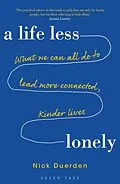'The practical advice in this book is gold dust not only for lonely people, but for those who long to help them.' - Joanna Lumley
Loneliness is an epidemic on the rise. It has long been documented that older people suffer from social isolation, but teenagers do too, likewise new parents, those with disability or illness, and anybody going through a significant life change.
As more people work full-time, and we interact via social media rather than face-to-face, we need to stop and ask ourselves: what can we do to ensure all our futures are more connected and socially satisfying?
This book will help to share stories of loneliness to increase our empathy and understanding of it, and to look for possible solutions. Using the research the Jo Cox Commission undertook following the MP's senseless death in 2016, it offers a wealth of practical advice: how to spot the symptoms in yourself and in others; how to ease them; how to seek help and, ultimately, how to understand this most fundamental of human emotions.
Its aim is simple: to provide us all with the tools we need to lead kinder, more connected lives.
Autorentext
Nick Duerden is a writer and journalist. He is the author of Get Well Soon (Bloomsbury).
Klappentext
Loneliness has reached the levels of an epidemic. From the bullied child to the new parent, from the pensioner who has outlived friends and family members to teenagers who manage their social lives through the glow of a mobile phone, it can - and does - affect anyone and everyone, irrespective of age, race or class. Many suffer in silence, convinced it's a confession too far, a sign of too much vulnerability, a shameful failing. But the human condition is not a failing.
What's it like when loneliness descends? How does it announce itself, and how do you recognise it? Do you discuss it, or conceal it? From where can you seek help?
A Life Less Lonely shares stories of loneliness and social isolation, and looks for ways in which we can help one another to future-proof ourselves against this most insidious affliction. By talking to those who suffer from it, and by highlighting the work of those who fight to combat it, the book offers guidance on how to spot the symptoms in yourself and in others, how to connect with those around you, and how, by understanding it all better, we might just set ourselves free from it.
In this way, what is an epidemic today might not be one tomorrow.
